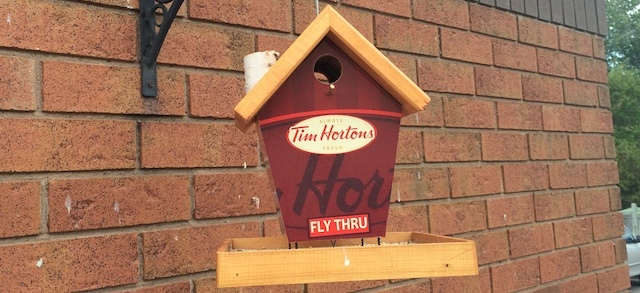Why I Think the Tim Hortons / Burger King Merger is a Bad Fit
Passing a recently renovated Tim Hortons, I came across a small bird feeder with “Fly-Thru” written on it. This small inviting touch had me thinking about how different Burger King and Tim Hortons are. Talk of a merger between the two companies is at a massive high this week. While it remains to be seen if the two will actually get together, I wanted to share some of my thoughts about how these two companies might fit. If the companies operate separately, this may have all been me jabbering on. But, since that’s unlikely, I wanted to give my perspective on why this merger looks like a bad idea.
Briefly: Just looking at the numbers, the proposed Tim Hortons/Burger King merger might look great. But, there is more to this story, and I explain why this might be a bad idea.
Through the 1980s and 1990s, I worked at Burger King in almost every capacity. The company as I remember it chose to always maximize profit and yield over all else. The kind of race to efficiency and profitability that Mcdonald’s enjoyed (and still does) always loomed over how we made Whoppers and fries. The effort we expended related to fine-tuning the amount of food made, and thus waste of food if the product didn’t sell. We weren’t often concerned with what customers did while in our restaurants unless they left behind a serious mess.
After all these years, I would expect Burger King has made countless changes from all levels of the company. But, when I go back to stores I used to work at – the ghost of those days still loom in the uninviting plastic chairs, the conveyer belt of cashiers, and jilted teenager at the register. There is a culture in Burger King that has long since turned over but may have never left these maroon covered halls.
Contrast that with Tim Hortons. I have close ties to those that work at one of their coffee shops, so I’ve learned more than I thought I ever would. Calling Timmy’s a Canadian landmark and source of pride for its people is not telling the whole story. There is something very Canadian about gathering over a coffee. Perhaps we never knew ourselves, but for as many years as I can remember, we would flock to bars, Coffee Times, Country Style’s and another type of communal (if not dingy) places and interact with each other. Perhaps Tim Hortons may have created the perfect meeting place for Canadians.
Tim Horton (with his partner Ron Joyce) created a coffee shop, but I feel what took this simple coffee shop into the stratosphere is its welcoming of Canadians. The many Timmy’s restaurants exist as an invitation to meet, linger, and take your time with a coffee. Meet and talk about the news. Meet to sell your wares (from Craigslist). Meet to sit down with a computer and use the Internet. In fact, that’s what I’m doing now.
I might have been dreaming, but I recall a newly opened Burger King in Oshawa offered Internet access, but it was quickly scrapped for unknown reasons. It would be pure conjecture on my part as to why, but it seems pretty clear that the Internet didn’t line up with the profitability Burger King expected. I should also say, my knowledge of American Burger King operations and culture is almost none. In the U.S. Burger King may have a very different culture and a more Timmy’s style culture.
This brings me back to Burger King’s purchase of Tim Hortons. There are definite business synergies that will benefit both companies. Tim’s may have easier access to expansion in America. Burger King may also have found a way to improve its tax position by relocating to Canada. But, when the dust settles on this merger, we’ll all realize the two cultures weren’t a great fit. When that happens, one or both will fail in ways that usually only hurt the customer.


